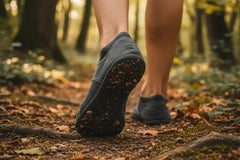5 Surfaces You Should Never Walk on Barefoot

Walking barefoot feels natural and freeing, but it’s not always safe. Some surfaces can hurt your feet, cause infections, or lead to serious injuries.
Whether you’re at the beach, in the gym, or just stepping outside, it’s smart to know where to keep your shoes on. Let’s look at the five worst places to go barefoot.
Table of contents
Key Takeaways
Protect your feet from burns, avoid walking barefoot on hot pavement or sand.
Don’t risk infection, always wear footwear in public showers and gyms.
Watch out for hidden hazards like glass, fishhooks, or sea creatures at the beach.
Prevent slips and falls by keeping shoes on slippery floors like tile or hardwood.
Support foot health by choosing the right surfaces and using minimal footwear wisely.

5 Surfaces You Should Never Walk on Barefoot
Walking barefoot can be risky. Hot pavement can burn skin in seconds, especially in summer.
Asphalt gets even hotter and can cause blisters. Gravel can bruise or cut your feet. Wooden decks may have splinters that cause infections. Even playground rubber mats can heat up and scrape skin. Think before going barefoot.
Hot Pavement Can Cause Serious Burns
On sunny days, pavement can reach temperatures of 145°F or more, hot enough to cause second-degree burns in seconds.
Bare feet, especially children's, are at risk due to more sensitive skin. Pets can also be injured; if the pavement is too hot for your hand, it's too hot for their paws.
If someone gets burned, rinse the area with cool (not icy) water and cover it loosely. Seek medical help if blisters appear.
Public Showers Are a Haven for Fungal Infections
Public showers may look clean, but walking barefoot in them puts your foot health at risk.
Warm, damp floors are ideal for fungi like athlete’s foot and toenail fungus. These infections spread when you step where an infected person has walked.
Fungal spores can survive on floors for hours, and even healthy people can get infected. It's not worth the risk.
Beaches May Hide Sharp Objects and Hot Sand
Walking barefoot on the beach can be risky. Sharp objects like broken glass, rusted metal, fishhooks, and jagged shells can cause cuts or punctures, leading to infection.
Hot sand can exceed 120°F and cause burns in seconds. Hidden sea creatures like crabs or stingrays can also injure you if stepped on. Always test the sand temperature and consider wearing protective shoes to stay safe.

Gym Floors Are Loaded With Bacteria and Germs
Walking barefoot on gym floors exposes you to harmful bacteria like MRSA, staph, and E. coli, which thrive in warm, sweaty environments.
These germs can cause serious skin infections and are often more concentrated on floors than equipment due to constant contamination from shoes.
Fungal infections like athlete’s foot also spread easily this way. Many of these pathogens can survive for days, making gym floors a persistent infection risk.
Hardwood and Tile Floors Can Lead to Slips and Falls
Hardwood and tile floors can be dangerously slippery, especially when wet or polished, increasing the risk of falls and injuries.
Use non-slip treatments, clean spills promptly, maintain good lighting, and inspect for hazards regularly to improve safety, especially in homes with children or elderly individuals.
Why Do My Feet Crack When I Walk Barefoot
Walking barefoot on hard surfaces can cause friction and strip your skin of natural oils, leading to dryness, calluses, and cracked heels.
Low humidity, certain medical conditions, and medications can worsen the issue. Moisturizing, exfoliating, and wearing proper footwear help prevent and manage foot cracking.
Does Walking Barefoot Cause Flat Feet
Walking barefoot doesn’t cause flat feet, but its effects vary. It can strengthen foot muscles and improve arch support for some, especially those with flat feet.
However, hard surfaces may lead to pain or injury. Individual needs and surfaces walked on are key factors.
Is Walking Barefoot on Carpet Bad for Your Feet
Walking barefoot on carpet can lead to dirt buildup and minor foot issues, like fatigue or injury from hidden objects.
While soft carpets may feel comfortable and aid foot strength, it’s generally better to wear socks or slippers for protection and hygiene, especially in cluttered areas.
Does Walking Barefoot Strengthen Your Feet
Walking barefoot or wearing minimal footwear can significantly strengthen your feet. A 2021 study in Scientific Reports found that after six months of using minimal footwear daily, participants increased foot strength by 57.4%.
This boost helps improve balance and walking. The study suggests that minimal footwear allows foot muscles to work naturally, leading to stronger arches and better overall foot function.





